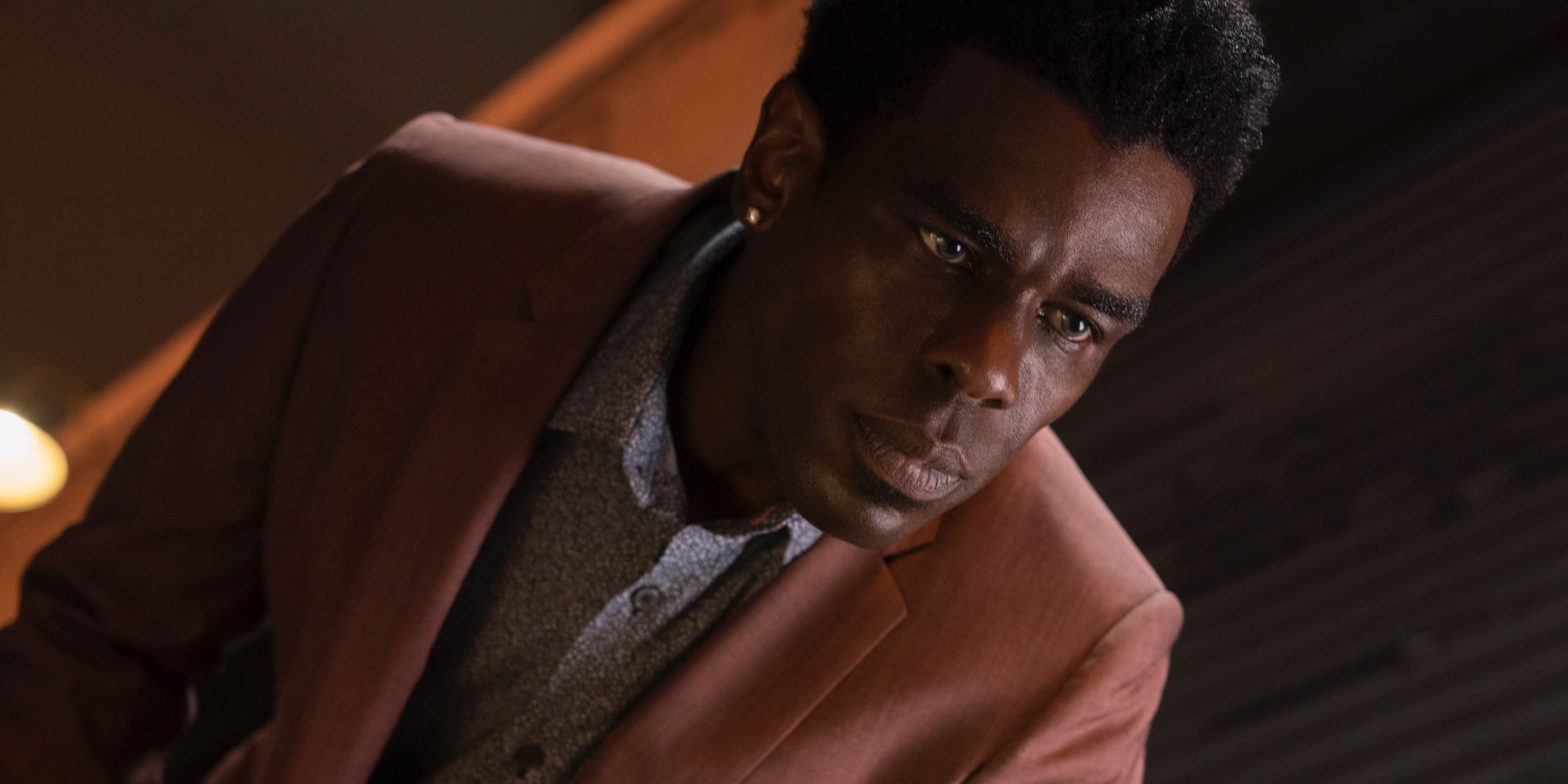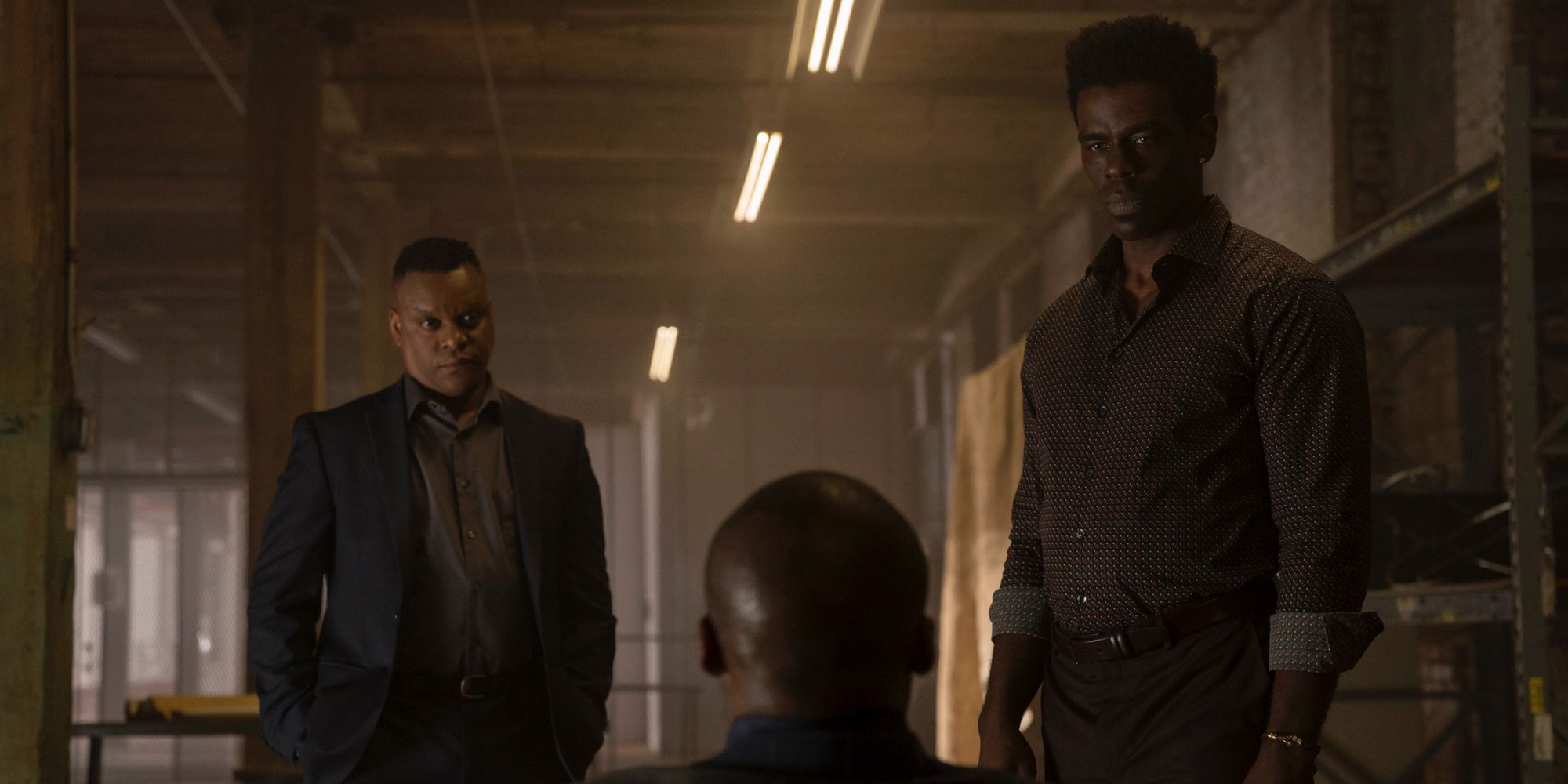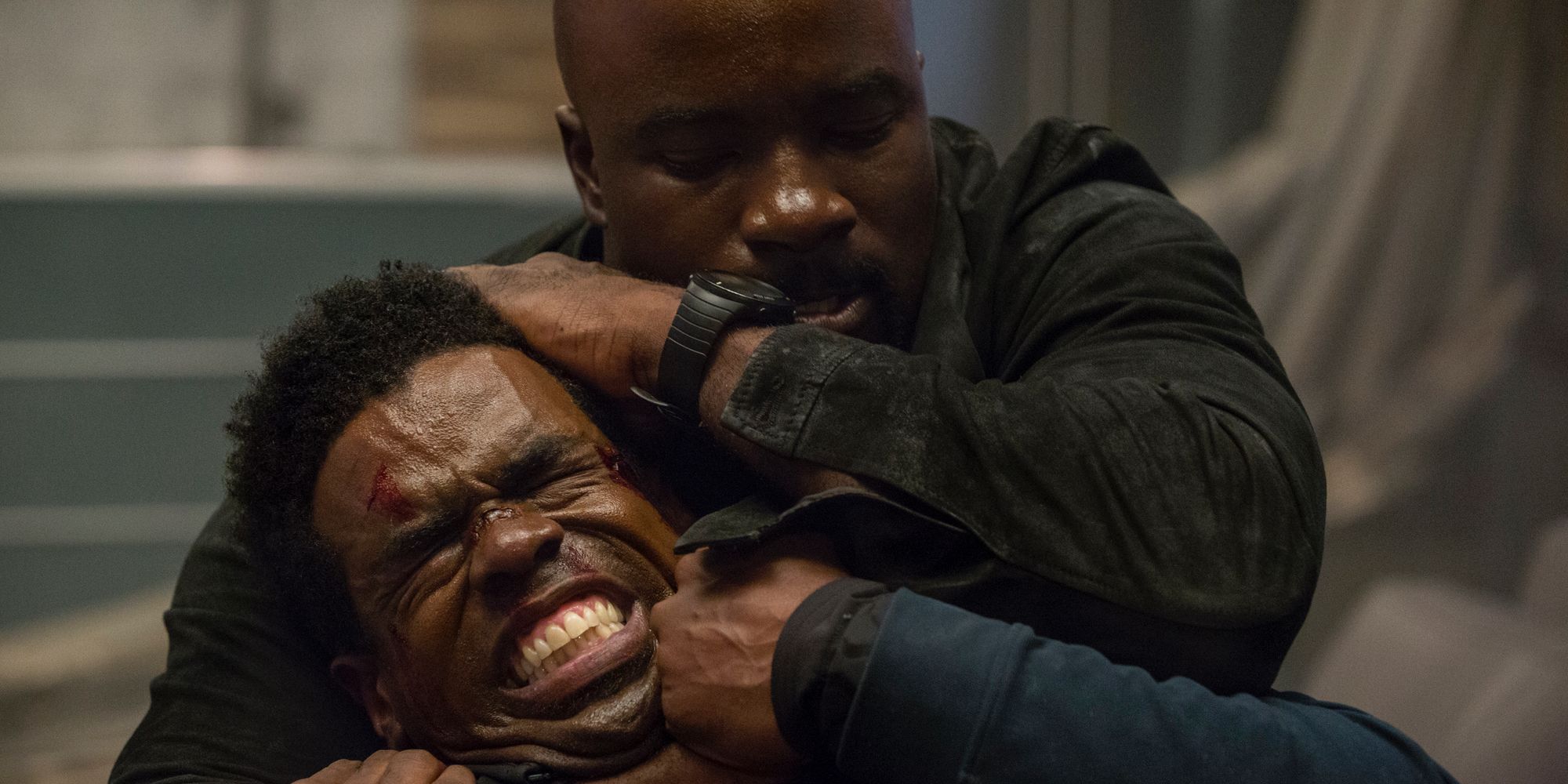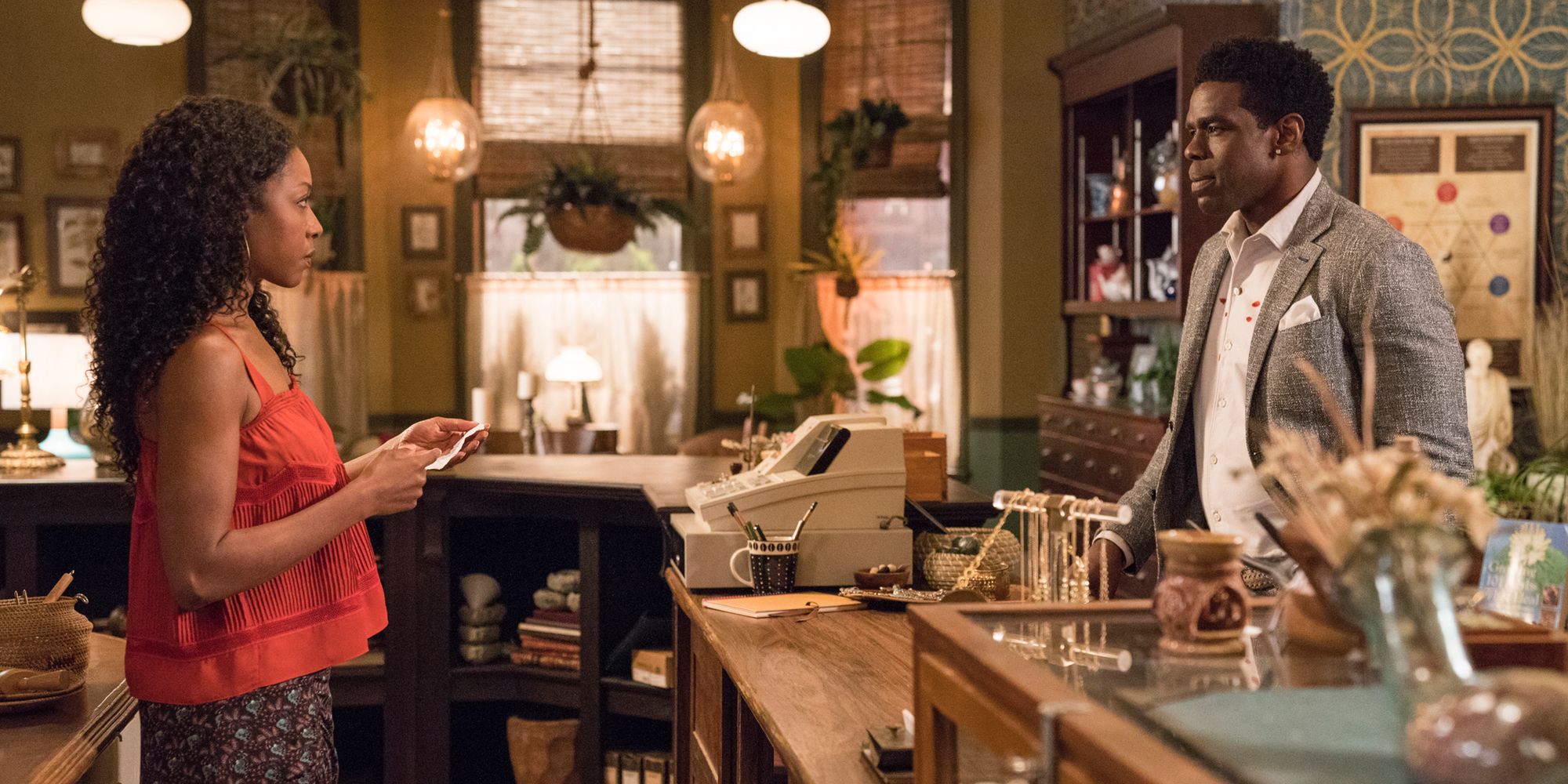Mustafa Shakir has made a splash as the new Big Bad in town in season 2 of Marvel’s Luke Cage. The actor takes on the role of John McIver, aka Bushmaster, a superpowered Jamaican gangster who not only gives Luke a run for his money in the strength and durability department, but is gunning for Mariah Dillard’s spot at the top of Harlem’s criminal food chain. Bushmaster’s gripe with Mariah is very personal, while his beef with Harlem’s Hero for Hire is more incidental — the bulletproof Cage is an obstacle in achieving his larger goal.
While the character of Bushmaster is one of the more interesting and compelling to come out of Netflix’s corner of the Marvel Cinematic Universe, it’s the performance from Shakir that makes it worth watching. A veteran of film and television, Shakir has been in a number of great series as of late, like The Night Of, Quarry, and The Deuce. He also had a role in last year’s memorable Brawl in Cell Block 99 opposite Vince Vaughn.
More: GLOW Season 2 Review: Maybe The Most Fun You Can Have Watching TV Right Now
Shakir spoke with Screen Rant about his role in Luke Cage, his background in martial arts, and his understanding of Jamaican culture and the immigrant experience. Check out what he had to say below:
Tell me a little bit about how you got involved in the the series and what appealed to you about the role.
"I went through the normal route, which was the managers and the agents. So I didn't really know what this guy was about at al;l I didn't know if he was superhuman or anything. I was just auditioning for Luke Cage. But once I found out, and found that it was Bushmaster, going through that whole Marvel process was pretty interesting and nerve-wracking but still very exciting.
I just love the fact that he's other. He has an accent, he has all these peculiar qualities about him that just makes the part juicy and interesting to me. But the physicality of it really appealed to me. I want to spend the latter days of my life practicing martial arts and just let that be my full-time passion. So it's nice to be able to incorporate that into my love of acting and art. That was really cool."
In addition to being one of the primary antagonists, what can you tell me about how Bushmaster fits into the seasons’ themes of family and legitimacy and everything else that’s going on?
"Mariah is trying to distance herself from the name Stokes, and that directly connects her to someone who wants redemption because of what the Stokes have done to his family name. [Bushmaster] comes in as a counterpoint to Mariah's bottom line, which is good drama. It's all relative to family. My character is trying to avenge his family and Mariah's trying to legitimize hers and bring to rest many of the demons that haunt her. I guess collectively we're all dealing -- whether it's me, Mariah, Luke Cage -- we're all dealing with the demons of our bloodlines. So that convergence is pretty phenomenal. It wasn't even scripted the way that I have a monologue in episode 7 that is intertwined with Luke talking to his father in a church, and we're talking about the same things. I think that's a really great highlight. We're natural antagonists to what each other's bottom lines are."
Your character has a unique fighting style that looks like capoeira. Is that about right?
"Yeah, it's a little hybrid; you've got some capoeira moves. But it's like bush fighting. Capoeira comes out of a longer tradition of bush fighting. There's that, and there's a little bit of boxing in there. I have studied capoeira, though not extensively. Basically with the role being physical already it's just like -- I made the adjustment, cut some weight starting to stay light and lean, so I could move around and be squirrelly. Then you go and you learn the choreography. They teach you the moves and you film it, but then I go home and I practice those moves so it's in my muscle memory and it's all set when I do my thing."
There are some pretty impressive fight sequences between you and Mike Colter. Tell me a bit about the process of putting together a compelling fight sequence, especially with the kind of choreography that was being used. How extensive of a process is that?
"Not as extensive as you would think. We're all predisposed to being physical. Me and Mike move pretty well. We have help, he have doubles. Even if we do a fight sequence and it goes perfectly, the doubles do it too, so that, just in case, there are areas that they can cut between. In terms of preparation for it, we have like two-to-three hour training sessions where we learn the choreography and like I said, we tape it, and so you go home with the video and you just keep moving. And how much time you put into that is up to you. Me, I wanted to sell the movement, so I put a lot of time into it. I just really incorporated it into my workout so that when I got on set, we were't worrying about whether or not I knew it or could do it. We could just run through it."
From your perspective, what goes into making a villain compelling? Is it important that the character see himself as the hero of his own story, or do you think that John McIver is more in touch with and accepting of who he is as an antagonist?
"You hit it right on the head, when you said 'Hero of his own story.' That's the catchphrase I use. In his mind all of his pursuits are noble, so as a result, he feels justified. That justification, I feel like it lightens his character up a little bit. He feels like 'You guys are gonna catch on to what I'm talking about. You are asleep and I'm not.' So I think because he feels angry about the things that have happened to him, I feel like he is empowered by his decision to act in life in a way to bring about vindication as well as push his own agenda. I think with that comes his charisma and presence. Aside from nursing his desire to get rid of the Stokes, I think he's a cool guy [Laughs]."
Let’s talk about playing a Jamaican gangster. For starters, how difficult was it to do the accent and how did you go about learning it?
"Well I tell everybody, I've got a love of accents and I've been doing them my whole life. A Jamaican accent was one that was just in my pocket for a long time. It was kismet -- I had one other role back on a show called Wanted back in the day, maybe about eight years ago, maybe more. It's just cool to finally be able to use it. The way that I tweaked it was I just immersed myself in Jamaican culture, listening to the music, watching old documentaries. I think ultimately, I sort of fashioned that after Jimmy Cliff, and Usain Bolt has these interesting facial movements when he speaks. But more so than making specific to anybody I took it all in and let whatever came out come out."
In terms of your process how do you work with the accent? How do you stay in that frame of mind? Do you find yourself thinking in that accent after a while? What do you do to maintain your grasp on an accent like that?
"I wish I had a more complicated story or method. It's kind of on tap. Specifically it's a feeling. It's a feeling in your gut you can tap into once you've place it. Moving in and out of that place, I guess is what an artist is, so in that capacity I use what I love about working with accents or anything really, just switch on an off."
What kind of research did you do or were you interested in doing to prepare for this role as a Jamaican immigrant?
"The beauty of Harlem and New York being the backdrop is that it's so diverse and multicultural. There's like little villages, block to block, neighborhood to neighborhood, sometimes many in one neighborhood. I've had lots of interactions with the Caribbean diaspora, my sister dated a guy from the area. Back in the day, growing up in Harlem on 142nd Street and Hamilton it was little Jamaica; there's still some patty shops up there. I've had quite bit of experience with Caribbean people and their experiences with immigration. I've heard a lot of their stories. It's kind of next to home. My dad is Nigerian, so I have a sensitivity to the immigrant experience in and of itself."
Next: 12 Monkeys’ Aaron Stanford Reflects On The Series Ending After 4 Seasons
Luke Cage season 2 is now streaming on Netflix.




